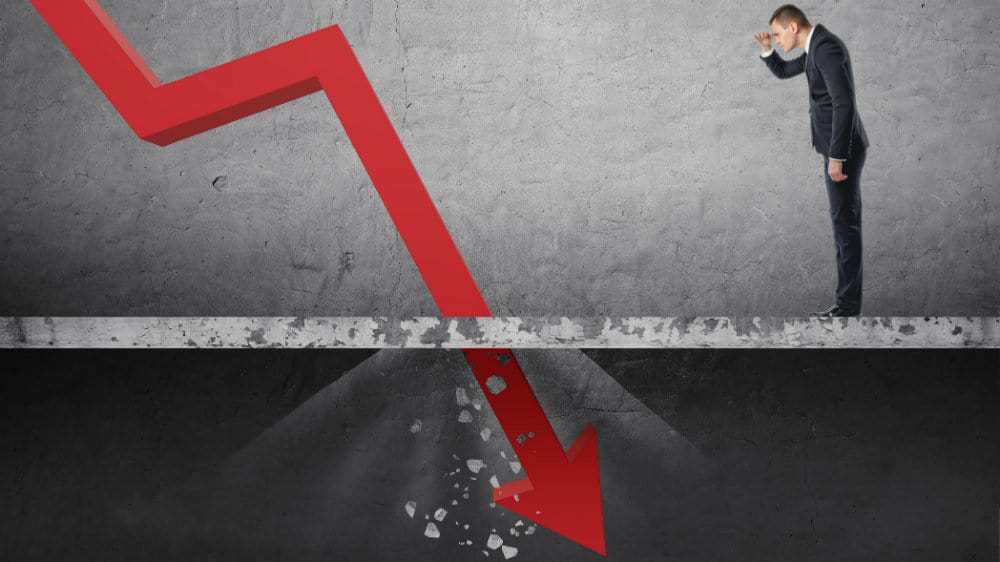Stock markets have been volatile in 2022 due to the headwinds of high inflation, rising interest rates and the war in Ukraine. Having dipped below 7,000 for the first time in a year, the FTSE 100 has recovered to 7,500 in the last month.
However, fears of a stock market crash remain. Peter Schiff, CEO at Euro Pacific Capital, believes that “Another financial crisis is evitable but what’s not inevitable is the nature of the crisis.” He adds, “At this point, we don’t know if it’s stocks, real estate or the US dollar that will crash.”
Here, I explain what might cause a stock market crash and look at three options for protecting your ISA portfolio.
[top_pitch]
What is a stock market crash?
A stock market crash is typically defined as a sudden drop of 10% or more in share prices, which is caused by investors panic-selling shares.
According to IG, the largest two peak-to-trough crashes in the FTSE 100 were the collapse of the dot-com bubble in 2003, with a fall of 53%, and a 49% decrease in 2009 due to the global financial crisis.
What could trigger a stock market crash?
Kimberly Amadeo from The Balance comments that “Crashes generally occur at the end of an extended bull market” when “prices are above the real values of the companies.”
There’s already been a stock market ‘correction’ in 2022, with a 15% fall in the Nasdaq. Dave Sekera from Morningstar comments that “Stretched valuations, coupled with rising interest rates, have landed a one-two punch on technology stocks to start the year.”
Macro-economic factors could also take their toll on share prices. The UK and US are increasing interest rates to combat soaring inflation, which is currently at a 30-year high. They’re also reducing their quantitative easing programmes which provided economic support during the pandemic.
David Jones, chief market strategist at Capital.com, comments that “Near-zero interest rates and central banks continuing to pump money into the system have helped to propel bull markets.”
David Jones also points out that higher inflation and significant geopolitical uncertainty “haven’t caused a major crash in most markets so far, but with so much unknown for the rest of the year, only the blindly optimistic would expect it to be business as usual in 2022.”
How to protect against a stock market crash
Stock markets have historically rebounded after crashes. According to IG, the FTSE delivered a 64% return in the year following the stock market crash from the global financial crisis. Our Foolish philosophy is to invest over the long-term, which helps to smooth out the natural cycles of the stock market.
However, investors might like to consider the following asset classes to diversify their portfolios in the event of a stock market crash.
1. Change of focus from growth to value stocks
Peter Schiff from Euro Pacific Capital sees a return to more traditional value investing, “where the stock pickers are going to start to make money, not the indexers.”
This is already evident in 2022, with a fall in the value of US technology stocks and an increase in the share prices of value companies such as Centrica, Shell and Aviva.
Funds are a good way of investing in a diversified portfolio of value stocks. Darius McDermott, managing director of Chelsea Financial Services, selects Ninety One Global Special Situations as “the fund to hold in your portfolio” if value “continues to do well or we go through a period of sharp swings.”
2. Rise in popularity of commodities
Investing in commodities may also act as a hedge against a stock market crash. Russia’s invasion of Ukraine has exacerbated existing issues of raw material shortages, further driving up prices.
Cazenove Capital debates whether we’re in “the early stages of another super-cycle in commodity prices and returns.” They point to “several structural similarities between the early 2020s and the early 2000s, the last time commodities began a long and powerful ascent to record prices.”
Investing in exchange-traded funds (ETFs) is a low-cost way of tracking commodities indices. The L&G All Commodities UCITS ETF tracks the Bloomberg Commodities Index and has delivered a 56% return in the last year. Hargreaves Lansdown, one of our top-rated ISA providers, offers this ETF to its ISA customers.
[middle_pitch]
3. Increase in the value of gold
David Jones comments that “A knee-jerk move higher for gold would be expected if there is a sharp sell-off for markets.” But he adds, “There is definitely a question of how sustainable that strength would be.”
Gold is viewed as a safe haven in the event of a stock market crash or high inflation. Gold rose by 47% after the stock market crash in 2008, almost reaching $1,000 per ounce. During the pandemic, the gold price soared to a record high of over $2,000 – an increase of 40%.
The iShares S&P/TSX Global Gold Index is a tracker ETF that has delivered a three-year return of 83%, according to Trustnet.







